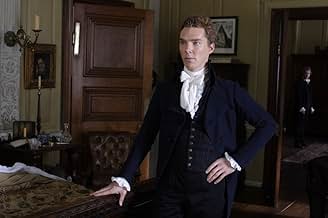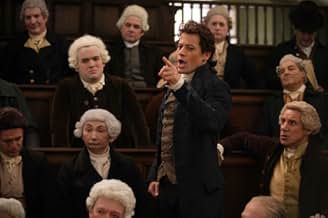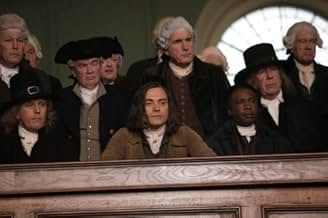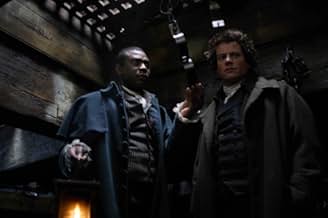IMDb-BEWERTUNG
7,4/10
26.244
IHRE BEWERTUNG
Füge eine Handlung in deiner Sprache hinzuThe idealist William Wilberforce maneuvers his way through Parliament, endeavoring to end the British transatlantic slave trade.The idealist William Wilberforce maneuvers his way through Parliament, endeavoring to end the British transatlantic slave trade.The idealist William Wilberforce maneuvers his way through Parliament, endeavoring to end the British transatlantic slave trade.
- Auszeichnungen
- 3 Gewinne & 6 Nominierungen insgesamt
Ciarán Hinds
- Lord Tarleton
- (as Ciaran Hinds)
Empfohlene Bewertungen
To see this well mounted but simplistic and worshipful bio-pic, one would think that William Wilberforce (and to a lesser extent, young Mr. Pitt) were the only members of Parliament to speak out against the war with America, then against the slave trade. Not so, folks - next time you're in Westminster Abbey, you might check out the large abolitionist monument dedicated someone whose fight against the slave trade predated that of Wilberforce and was widely recognized during his liftetime: Charles James Fox.
Yes, that same Fox so inaccurately identified in the film as a tame follower of Wilberforce, agonizing over the slavery question and finally swayed by the young man's eloquence. Truth is, Fox - whose pro-American, pro-French Revolution, anti-slavery and anti-absolute monarchy sentiments put him at odds with George III during nearly his entire political career - was a "phenomenon of the age" in the words of a contemporary, and one of Parliament's most eloquent speakers on a range of causes that certainly rivalled those of Wilberforce.
He was also only 10 years older than Pitt, something you'd never guess from the fright-wig makeup Michael Gambon wears.
You can understand why such scripting decisions are made: Wilberforce has to be young and sexy to be attractive, and his more priggish attitudes (he often urged Parliament to pass laws prohibiting all amusements on Sundays, and was appalled at what he deemed Fox's immorality: his drinking, gambling and womanizing) have to be eliminated. It's a shame, because Wilberforce was all the more interesting for being a complex human - but it's so much easier to make him terribly young, eager and dashing, and all other politicians of the day old and timid.
Other strange egregious errors: Fox was not a lord, nor would you find any lords among Wilberforce's fellows in the House; lords do not sit in the House of Commons. The character identified as the king's son, the Duke of Cumberland, would have been about 12 years old at the time of the movie's action. Pitt was prime minister for some 20 years, yet his cautious political trimming was at least partly responsible for the slave trade continuing as long as it did.
It was a pleasant enough film and rousing in parts, but I prefer my history more red-blooded and reflective of real human beings.
Yes, that same Fox so inaccurately identified in the film as a tame follower of Wilberforce, agonizing over the slavery question and finally swayed by the young man's eloquence. Truth is, Fox - whose pro-American, pro-French Revolution, anti-slavery and anti-absolute monarchy sentiments put him at odds with George III during nearly his entire political career - was a "phenomenon of the age" in the words of a contemporary, and one of Parliament's most eloquent speakers on a range of causes that certainly rivalled those of Wilberforce.
He was also only 10 years older than Pitt, something you'd never guess from the fright-wig makeup Michael Gambon wears.
You can understand why such scripting decisions are made: Wilberforce has to be young and sexy to be attractive, and his more priggish attitudes (he often urged Parliament to pass laws prohibiting all amusements on Sundays, and was appalled at what he deemed Fox's immorality: his drinking, gambling and womanizing) have to be eliminated. It's a shame, because Wilberforce was all the more interesting for being a complex human - but it's so much easier to make him terribly young, eager and dashing, and all other politicians of the day old and timid.
Other strange egregious errors: Fox was not a lord, nor would you find any lords among Wilberforce's fellows in the House; lords do not sit in the House of Commons. The character identified as the king's son, the Duke of Cumberland, would have been about 12 years old at the time of the movie's action. Pitt was prime minister for some 20 years, yet his cautious political trimming was at least partly responsible for the slave trade continuing as long as it did.
It was a pleasant enough film and rousing in parts, but I prefer my history more red-blooded and reflective of real human beings.
I was well impressed with Amazing Grace; the period was superbly captured, and the interplay of the main action (the fight of William Wilberforce to abolish British slavery) with the other great events of his time (the American and French revolutions) was well presented. The film stirs the emotions but informs the mind. Ioan Gruffudd as Wilberforce is believable and depicts the tenacious Yorkshire MP with both his bodily weakness and great spirit well. Albert Finney as John Newton renders a moving portrayal of the ex-slave trader turned evangelical minister who influences Wilberforce's decision to remain in politics rather than entering the ministry of the church. Benedict Cumberbatch gives a strong representation of William Pitt, and the overall impression of the film is one whose history has been well researched. Well worth a viewing.
What follows is the text of a letter I composed for my parish bulletin (I am a priest and pastor of a University Parish in Tucson) after having seen Amazing Grace. I often recommend movies to my parishioners, but seldom write a full-fledged review. This weekend I made an exception for an exceptional movie.
Dear Friends,
It is a movie-lovers' favorite weekend: Oscar weekend. So I beg your indulgence as I offer not just a movie recommendation, but an actual review of the remarkable movie I saw on Friday. I had been hearing about it for several weeks and looking forward to its opening in Tucson. "Amazing Grace" tells the story of William Wilberforce, a young American Revolution era British Parliamentarian who waged a three-decade legislative battle to end Great Britain's involvement in the African slave trade (Slavery was outlawed in England six decades before our civil war.) Among those who had influenced this remarkable Englishman was John Newton, the slave ship captain turned evangelical preacher, who penned the lyrics of arguably the best known sacred song in the world, which also lends its title to the movie. Newton had known Wilberforce as a child and, in the film, serves as his conscience when the task is unclear or proves daunting..
This is no schmaltzy feel-good biopic. Everything about it is compelling. It is beautifully written and directed. The cinematography and film-editing are superb. The costume and sets are exquisite. And the acting is top-notch. Ioan Gruffudd, the young Welchman best known for his excellent portrayal of C.S. Forester's seafaring hero, Horatio Hornblower, in eight made-for-A&E movies (1998-2003), brings great depth and passion to his portrayal of this complex hero of social justice. Gruffudd's star is on the rise. Awardwinning actor, Albert Finney, graces this picture as an aged and eccentric Newton. The cast is rounded out by a gaggle of veteran British character actors who lend profundity to this compelling story. In addition to the cinematic elements that make this one of the few movies I have seen that I consider to be worth the $9 it costs to see a movie these days, it is first-rate storytelling! And Wilberforce is a hero whose story must be told. He grappled with one of my favorite issues: the place of faith in public life. As a young man, the rising political star began to rediscover an intense faith that had lain dormant for a time. His fire of conviction that something must be done about the slave trade was fueled by this reemerging faith. As he struggled with whether he should use his oratorical talents a politician or a preacher, he is convinced that he can use his popularity as an MP to do God's work by actively advocating for the voiceless slaves. The movie presents the story of a man who finds a perfect balance between his faith and his public lifeeach shaping the other in the face of a clear vocation. That his secular realm is that of politics and the time is one of great fear and institutionalized injustice gives this period movie much relevance in today's world. I hope every person of faith watches this movie. I especially think that it is pertinent for our student parishioners who may be struggling with the same issues as Wilburforce. (While I fear it would bore younger children, it would be good for older children and teens.) It opened on Friday at the El Con Cinema. I will be organizing a parish outing to see "Amazing Grace" in a couple of weeks. Whether you go then or another time, I recommend this movie as a great Lenten exercise. I loved it and consider it one of the most socially relevant films I've ever seen. "Amazing Grace" has long been one of my favorite sacred songs, but I will never hear it the same again.
Peace, Fr. Bart
Dear Friends,
It is a movie-lovers' favorite weekend: Oscar weekend. So I beg your indulgence as I offer not just a movie recommendation, but an actual review of the remarkable movie I saw on Friday. I had been hearing about it for several weeks and looking forward to its opening in Tucson. "Amazing Grace" tells the story of William Wilberforce, a young American Revolution era British Parliamentarian who waged a three-decade legislative battle to end Great Britain's involvement in the African slave trade (Slavery was outlawed in England six decades before our civil war.) Among those who had influenced this remarkable Englishman was John Newton, the slave ship captain turned evangelical preacher, who penned the lyrics of arguably the best known sacred song in the world, which also lends its title to the movie. Newton had known Wilberforce as a child and, in the film, serves as his conscience when the task is unclear or proves daunting..
This is no schmaltzy feel-good biopic. Everything about it is compelling. It is beautifully written and directed. The cinematography and film-editing are superb. The costume and sets are exquisite. And the acting is top-notch. Ioan Gruffudd, the young Welchman best known for his excellent portrayal of C.S. Forester's seafaring hero, Horatio Hornblower, in eight made-for-A&E movies (1998-2003), brings great depth and passion to his portrayal of this complex hero of social justice. Gruffudd's star is on the rise. Awardwinning actor, Albert Finney, graces this picture as an aged and eccentric Newton. The cast is rounded out by a gaggle of veteran British character actors who lend profundity to this compelling story. In addition to the cinematic elements that make this one of the few movies I have seen that I consider to be worth the $9 it costs to see a movie these days, it is first-rate storytelling! And Wilberforce is a hero whose story must be told. He grappled with one of my favorite issues: the place of faith in public life. As a young man, the rising political star began to rediscover an intense faith that had lain dormant for a time. His fire of conviction that something must be done about the slave trade was fueled by this reemerging faith. As he struggled with whether he should use his oratorical talents a politician or a preacher, he is convinced that he can use his popularity as an MP to do God's work by actively advocating for the voiceless slaves. The movie presents the story of a man who finds a perfect balance between his faith and his public lifeeach shaping the other in the face of a clear vocation. That his secular realm is that of politics and the time is one of great fear and institutionalized injustice gives this period movie much relevance in today's world. I hope every person of faith watches this movie. I especially think that it is pertinent for our student parishioners who may be struggling with the same issues as Wilburforce. (While I fear it would bore younger children, it would be good for older children and teens.) It opened on Friday at the El Con Cinema. I will be organizing a parish outing to see "Amazing Grace" in a couple of weeks. Whether you go then or another time, I recommend this movie as a great Lenten exercise. I loved it and consider it one of the most socially relevant films I've ever seen. "Amazing Grace" has long been one of my favorite sacred songs, but I will never hear it the same again.
Peace, Fr. Bart
10tollini
I saw this film on October 10th, 2006 in Indianapolis. I am one of the judges for the Heartland Film Festival's Truly Moving Picture Award. A Truly Moving Picture "
explores the human journey by artistically expressing hope and respect for the positive values of life." Heartland gave that award to this film.
This is an inspiring story based on a legendary historical British Member of Parliament, William Wilberforce. During the late 18th century and early 19th century, a very young Wilberforce is elected to Parliament and over the course of several decades leads the fight to ban slavery.
Today this seems like an easy, obvious and intuitive decision. But this was not so 200 years ago. The film clearly explains the entrenched economic motives and the political motives for slavery. Wilberforce starts out as almost a force of one and slowly builds abolitionist momentum by brilliant oratory, political maneuvers, and appealing to his fellow man's better nature.
Ioan Gruffudd is totally believable in explaining to the audience the complexity and heroism of Wilberforce. Wilberforce over the course of his life is sickly and strong, religious and worldly, naive and romantic, and idealistic and practical.
During the course of this mostly political story, we get to see the immense cruelty shown to the captured Africans turned into slaves. We are shown the slave sailing ships where the captured are treated inhumanely and die of starvation, neglect, disease, and filth. Man's inhumanity to man was never worse.
Wilberforce is a great man of history even though mostly forgotten today. He respected his fellow man regardless of their station in life. He was always willing to sacrifice his life and health to help others. And his compassion and spirit was always masked by his humility. He is a hero for all ages.
This is a period piece and you are lost in it because of the attention to detail. The sets, art direction, and costumes allow you to totally suspend disbelief and be moved by the story.
FYI There is a Truly Moving Pictures web site where there is a listing of past Truly Moving Picture Award winners that are now either at the theater or available on video.
This is an inspiring story based on a legendary historical British Member of Parliament, William Wilberforce. During the late 18th century and early 19th century, a very young Wilberforce is elected to Parliament and over the course of several decades leads the fight to ban slavery.
Today this seems like an easy, obvious and intuitive decision. But this was not so 200 years ago. The film clearly explains the entrenched economic motives and the political motives for slavery. Wilberforce starts out as almost a force of one and slowly builds abolitionist momentum by brilliant oratory, political maneuvers, and appealing to his fellow man's better nature.
Ioan Gruffudd is totally believable in explaining to the audience the complexity and heroism of Wilberforce. Wilberforce over the course of his life is sickly and strong, religious and worldly, naive and romantic, and idealistic and practical.
During the course of this mostly political story, we get to see the immense cruelty shown to the captured Africans turned into slaves. We are shown the slave sailing ships where the captured are treated inhumanely and die of starvation, neglect, disease, and filth. Man's inhumanity to man was never worse.
Wilberforce is a great man of history even though mostly forgotten today. He respected his fellow man regardless of their station in life. He was always willing to sacrifice his life and health to help others. And his compassion and spirit was always masked by his humility. He is a hero for all ages.
This is a period piece and you are lost in it because of the attention to detail. The sets, art direction, and costumes allow you to totally suspend disbelief and be moved by the story.
FYI There is a Truly Moving Pictures web site where there is a listing of past Truly Moving Picture Award winners that are now either at the theater or available on video.
This is a lovely, moving and intelligent film. I did not detect any notably weak performances among a remarkable cast. The older actors though, Michael Gambon and Albert Finney, were shameless scene stealers, but one can hardly fault them for their excellence. There were many things to like about this film. It was gorgeous to look at, brilliantly capturing the look and sound of a sumptuous age. The pacing and editing were fine, though the device using flashbacks for most of the film occasionally led to a moments confusion about when a scene was supposed to be taking place. And the story itself is quite inspirational. A note for my Canadian readers and the Canadians who attended the TIFF screenings. The film mostly covered the struggle to outlaw slavery in Britain itself, though they did touch on Wilberforce's efforts to have it outlawed throughout the British Empire. This continued in the years after the conclusion of the film, and a Bill to do just that was passed in 1833, a month after Wilberforce died. So the film we watched was very much about our own history, and the story of the abolition of slavery in Britain directly affected the eventual abolition of slavery in Canada.
Wusstest du schon
- WissenswertesDuring the scene in which William Wilberforce (Ioan Gruffudd) sings "Amazing Grace" at the card house, the singing was performed live by Gruffudd. In the previous several takes, a playback had been used, but it is Gruffudd singing in the final film. Director Michael Apted had no idea whether or not Gruffudd could actually sing. Little did he know, Gruffudd is an accomplished soloist and choir singer. With a little practice, Gruffudd performed for the first time on-set while the cameras were rolling, all much to the surprise of the cast, crew, and director.
- PatzerThere were at least 3 grammar mistakes: several uses of "I" when "me" should have been used. Wilburforce also says "By who?" As a graduate of Cambridge, he would have said, "By whom?"
- Zitate
John Newton: Although my memory's fading, I remember two things very clearly. I'm a great sinner and Christ is a great Savior.
- VerbindungenFeatured in Tavis Smiley: Folge vom 23. Januar 2007 (2007)
Top-Auswahl
Melde dich zum Bewerten an und greife auf die Watchlist für personalisierte Empfehlungen zu.
Details
- Erscheinungsdatum
- Herkunftsländer
- Offizieller Standort
- Sprache
- Auch bekannt als
- Amazing Grace
- Drehorte
- Produktionsfirmen
- Weitere beteiligte Unternehmen bei IMDbPro anzeigen
Box Office
- Bruttoertrag in den USA und Kanada
- 21.250.683 $
- Eröffnungswochenende in den USA und in Kanada
- 4.305.000 $
- 25. Feb. 2007
- Weltweiter Bruttoertrag
- 32.120.360 $
- Laufzeit
- 1 Std. 58 Min.(118 min)
- Farbe
- Sound-Mix
- Seitenverhältnis
- 1.85 : 1
Zu dieser Seite beitragen
Bearbeitung vorschlagen oder fehlenden Inhalt hinzufügen































